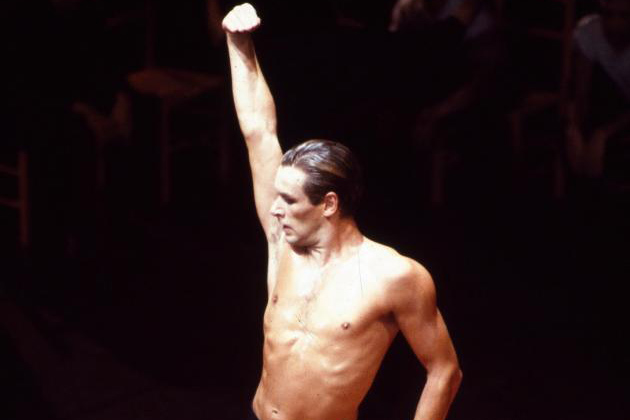La matrice russa resta in sottofondo al balletto in tutto l’Occidente, avendo vinto oltremare sulla scuola italiana e su quella francese o danese, le più antiche.
In Russia che succede? Si mantiene il repertorio costruito in epoca sovietica da coreografi come Oleg Vinogradov al Marinsky-Kirov e Yury Grigorovich al Bolshoi di Mosca, che però ora ospita anche lavori di George Balanchine e Alexei Ratmansky, ricostruttore dalle notazioni originali, mentre si presentano edizioni filologiche dei titoli di grande repertorio a cura di Sergej Vikharev.
Si mira anche ad allevare nuovi coreo-autori come Yuri Possokhov che ha firmato la mise en danse nel 2017 della creazione Nureyev, raccontando la storia-epopea del transfugo, A hero of our Times, non senza fare scandalo. Il cerchio si chiude finalmente anche nell’ex impero zarista, nel nuovo millennio.
Il balletto francese
In tutto questo che succede alla Francia e all’Opéra di Parigi, da dove proviene Manuel Legris, étoile nureyeviana? Negli anni 60-70 la Francia, culla del balletto dai tempi del Re Sole, se negli anni ‘80 era stata la nouvelle danse sostenuta dal governo a fare l’andatura, il balletto nazionale aveva ripreso quota nel mondo con il cosmopolita Maurice Béjart, per altro basato prima a Bruxelles e poi a Lausanne, mentre il suo competitor Roland Petit fondava i Ballets de Marseille.
L’Opéra, nel cuore della Ville Lumière, aveva insediato Patrick Dupond (1959), étoile della casa, francesissimo di formazione, a dirigere il balletto per cinque anni dopo la scomparsa di Nureyev (1990-1995).
Il suo fuoco di ballerino, condito con un pizzico di follia e con uno slancio spinto fino all’azzardo, ne aveva fatto un grande interprete del dionisiaco Bolero béjartiano, ambìto da tante star (in Russia Maya Plisetskaya; in Inghilterra la francese Sylvie Guillem, in Italia Roberto Bolle e persino Carla Fracci), ma pane per pochi. È appena scomparso con lui un artista ispirato, un maudit di grande talento.
Classical ballet and geopolitics
Russia, the Great Mother of Ballet
The Russian matrix remains in the background of ballet throughout the West, having won overseas over the Italian and French or Danish schools, being the oldest.
What’s happening in Russia? It maintains the repertoire built in Soviet times by choreographers such as Oleg Vinogradov to Marinsky-Kirov and Yury Grigorovich at Bolshoi of Moscow, which now also hosts works by George Balanchine and Alexei Ratmansky, reconstructor from the original notations, while philological editions of the great repertoire titles are presented by Sergej Vikharev.
It also aims to raise new choreograph-authors such as Yuri Possokhov, who signed the mise en danse in 2017 of the Nureyev creation, telling the epic-story of the refugee, A hero of our Times, not without causing a scandal. The circle is finally closed also in the former Tsarist empire, in the new millennium.
The French Ballet
In all this that happened to France and the Paris Opera, where does Manuel Legris, étoile Nureyeviana come from? In the 1960s to 1970s in France, cradle of ballet since the time of the Sun King, if in the 1980s it was the government-backed nouvelle danse that set the pace, the national ballet had regained share in the world with cosmopolitan Maurice Béjart, first based in Brussels and then in Lausanne. Meanwhile her competitor Roland Petit founded the Ballets de Marseille.
The Opéra, in the heart of the Ville Lumière, had installed Patrick Dupond (1959), étoile of the house, very French by training, to direct the ballet for five years after Nureyev’s disappearance (1990-1995)
His fire as a dancer, seasoned with a pinch of madness and with a momentum pushed up to the gamble, had made him a great interpreter of the dionysian Bolero béjartiano, coveted by many stars (in Russia Maya Plisetskaya, in England the French Sylvie Guillem, in Italy Roberto Bolle and even Carla Fracci). An inspired artist just passed away with him, a very talented maudit.








